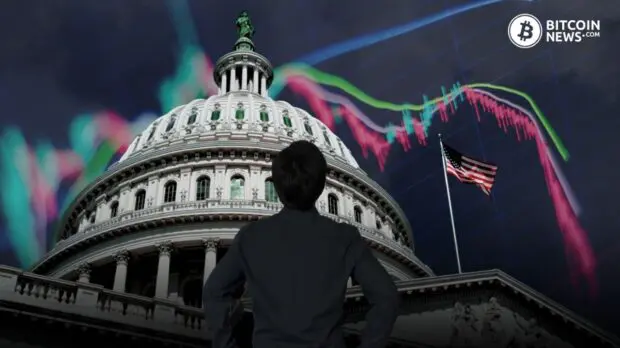In a report published on Friday, renowned credit rating agency Moody revised its outlook on the U.S. economic state. The agency announced a US credit rating downgrade, moving it from “stable” to “negative,” intensifying concerns over the nation’s fiscal health.
This move, attributed to significant fiscal deficits and diminishing debt affordability, echoes a similar downgrade by Fitch earlier this year.
The US Credit Rating Downgrade: “Negative”
The U.S. government’s fiscal policies and the increasing political polarization have been key worries for investors. Notably, this has contributed to a sell-off that has pushed government bond prices to their lowest levels in 16 years.
Related reading: El Salvador Bitcoin Bond Returns Soar to 70% in 2023
Related reading: JPMorgan El Salvador Report: Growth Forecast Jumps to 3.9%
The growing fiscal deficit, coupled with the escalating share of the budget allocated to interest costs, poses a persistent challenge. Christopher Hodge, chief economist for the U.S. at Natixis, stated:
“It is hard to disagree with the rationale, with no reasonable expectation for fiscal consolidation any time soon. Deficits will remain large, and as interest costs take up a larger share of the budget, the debt burden will continue to grow.”
While Moody’s shift in outlook suggests a potential downgrade in the medium term, it maintained the U.S.’s long-term issuer and senior unsecured ratings at ‘Aaa,’ emphasizing the nation’s credit and economic strengths. The government, grappling with these challenges, has seen other major rating agencies like Fitch and S&P previously downgrade their ratings.
Biden Criticizes Moody’s Decision
The Biden administration swiftly criticized Moody’s decision, attributing it to “congressional Republican extremism and dysfunction.” The administration emphasized the resilience of the American economy, citing over $1 trillion in deficit reduction measures and a proposal to further reduce the deficit by nearly $2.5 trillion over the next decade.
Bitcoin as a Safe Haven
Amidst these fiscal concerns, a surge in Treasury yields, as noted by Moody’s, is linked to expectations of a tight monetary policy by the Federal Reserve and concerns about fiscal issues. This backdrop highlights the appeal of alternative assets like Bitcoin, which is often positioned as a hedge against traditional financial market uncertainties.
Investors are increasingly recognizing the need for diversified assets. Bitcoin, with its decentralized nature and limited supply, is gaining attention as a store of value and a potential hedge against economic uncertainties.
A recent report by Nickel Digital Asset Management underscores a noteworthy 97% optimism among institutional investors regarding the future of Bitcoin. Despite the challenges faced by the U.S. economy, marked by crippling debt and financial uncertainties, Bitcoin has undergone a substantial surge in its price, with a remarkable 50% increase over the past two months.
Moody’s Outlook
Moody’s negative outlook on the U.S. credit rating underscores the precarious fiscal situation and political challenges. The recent political landscape, combined with fiscal challenges, has raised the stakes for President Joe Biden in the upcoming elections. The pressure on congressional Republicans to address funding legislation and avert a partial government shutdown adds another layer of complexity to an already tense situation.
Related reading:










